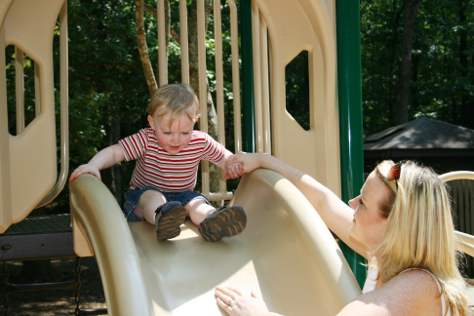How to know if you are a helicopter parent
Recognising signs that you’re a helicopter parent

There are lots of parenting terms bounded around today, one that has become increasingly common is the term helicopter parenting. We look into what it is to be a helicopter parents and what signs to spot that you are one.
What is a helicopter parent?
The term helicopter parenting derives from what a helicopter does, it hovers, and that’s what helicopter parents do. They hover close to their children and are rarely out of reach for them, wherever their children are. This can be particularly the case at the park where the child is climbing and mum’s arms are hovering round the child just in case they fall.
Essentially the term relates to the so-called practice of ‘over-parenting’ and helicopter parents often overprotect their children at the expense of nurturing their sense of independence.
The positive effects of not being a helicopter parent
Helicopter parenting can possibly negatively impact your child in some of the following ways:
- Your child grows up to be less confident about dealing with:
- Separation anxiety
- Making their own decisions
- Taking the initiative
- Failing – Ok nobody likes to fail but this failing can feel worse if a helicopter parent persists in expecting their child to win their approval with success and scores
- Beginning new interactions with others
Here are some common signs you may be a helicopter parent:
Protecting them from failure
No parent wants to see their child fail but it is a life lesson to learn from your mistakes and your little ones need to learn this. Trial and error teaches them how to make it in the world. Try reminding them if they’re upset by a mistake that everyone makes mistakes and help them see what they can learn from it.
Quick to prevent them getting cuts and scrapes
Kids run, jump, climb, and fall. A lot. Hands, elbows, and knees are often the areas that get hurt as a result, but if you’re a parent who tries to stop them getting into scrapes at every risk to a grazed knee, this is a sign of helicopter parenting.
Get them ready for school
Are you the parent that always helps your pre-schooler get dressed? Insist on putting their shoes on for them rather than letting them have a go? Even if you have to allow an extra few minutes in the morning while they get their own shoes on, it will allow them to learn a little independence which they will need for school.
Keeping your kids close
If you’re the parent that sticks around at a birthday party when other parents have dropped off and gone, you may be a helicopter parent.
Maybe time to try and leave them, if you stay in the area and walk the dog locally, it’s allowing them a bit of independence from you but you’re still close by in case you’re needed.
Fighting your child's battles
Children can come home from nursery or school moaning they’ve fallen out with someone or one of their friends was ‘mean’ to them. If you’re the parent who gets straight on the phone to the child’s parents to help sort it out, this is a sign of helicopter parenting. Sometimes it’s a good to listen to what your child is saying and maybe offer some advice of how best to approach it themselves the next day.
How not to be a helicopter parent
Here are some tips on how to manage your helicopter parenting tendencies.
Give them responsibilities
Giving each child their own chore is a great way for kids to learn to work on their own and develop skills they’ll need later in life. It can be a little thing such as being responsible for all the toys to go back in the box at the end of the day.
Don’t take over
Resist the urge to jump in to do a task your little one maybe struggling with, such as tying their own shoe laces. Give them advice and encouragement to complete the job themselves.
Let your kids learn
For example, if you’ve warned your little one that running too fast, may make them fall, rather than dive in to stop them each time, sometimes if it’s not a dangerous situation obviously, let them find out for themselves. The understanding or consequence and memory of a grazed knee might ensure they take it more steady next time.
Offer encouragement
Praise your little ones for their achievements but think about how you word it. Rather than saying ‘great job’ when they’ve tied their shoelaces which may make them feel a need to do things to please you, try something like ‘You must be very proud you’ve done that all by yourself…you’re such a big girl/boy!’